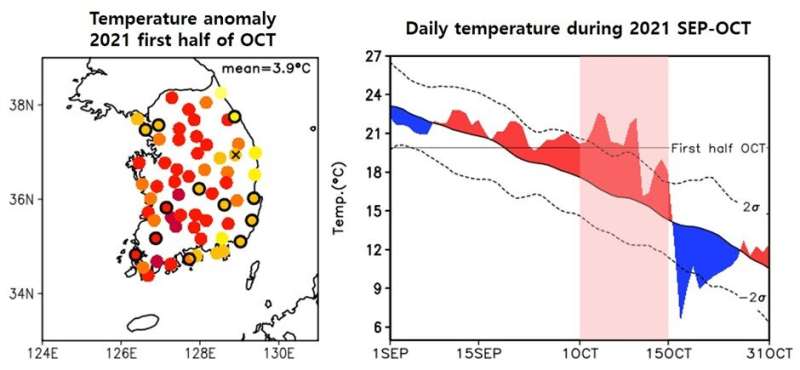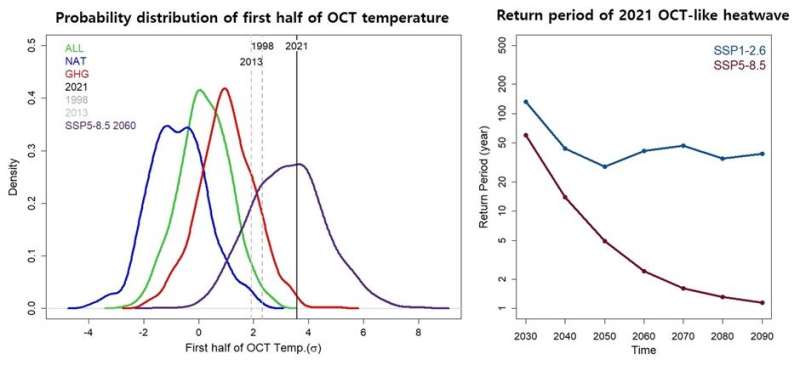The new normal already? Examining the changing probability of a summer-like fall

In October 2021, South Korea experienced a heatwave of an unprecedented magnitude. During the first half of the month, the average temperature was recorded at 19.9 °C, marking a 3.9 °C increase above normal. This event was unparalleled, anticipated to arise only once in thousands of years.
The abnormal warmth was triggered by a delayed appearance of an anomalous high pressure, which typically occurs during midsummer, leading to daily maximum temperatures of over 30°C in the southern region. This resulted in significant socioeconomic damages including agriculture across the country. A similar temperature spike with extreme magnitude has occurred in November 2022, raising public awareness of the intensifying fall heatwaves.
A research team at POSTECH led by Professor Seung-Ki Min and Research Professor Yeon-Hee Kim (Division of Environmental Science and Engineering) confirmed the record-high temperature recorded in October 2021 would have been highly improbable without the influence of global warming.
This study was conducted in collaboration with the Ulsan National Institute of Science and Technology, the National Institute of Meteorological Sciences, and the U.K. Met Office. The research findings were featured in a special issue of Bulletin of the American Meteorological Society.
The team used large datasets from CMIP6 global climate models and the U.K. Met Office’s large ensemble simulations to understand the impact of human activities on the unprecedented high temperatures. They assessed changes in probabilities of how frequent extremely high temperatures such as those of October 2021 could occur due to human-induced global warming. Additionally, the team, for the first time, quantified how often such heatwaves may occur during future fall seasons under different greenhouse gas emission scenarios.

The researchers confirmed that without the anthropogenic increase in greenhouse gases, high temperatures like those in October 2021 would have been extremely unlikely to occur. Even model simulations including greenhouse gas increases showed such high temperatures would happen very rarely, only once in hundreds of years.
The team also predicted that without drastic reductions in greenhouse gas emissions, the frequency of October 2021-like fall heatwaves is likely to increase dramatically with such warming likely occurring once every two years in the 2060s. However, if we can achieve the goals set out in the Paris Agreement to limit the global mean temperature to below 2°C above pre-industrial levels, extreme fall warmth would happen only once every 30 to 40 years.
This provides important implications for the expansion of the summer season that is occurring rapidly and strongly across the Northern extra-tropics.
“As unprecedented high temperatures during fall are occurring more frequently, it is necessary to provide an accurate prediction of their near-term occurrences and also prepare corresponding adaptation measures to minimize associated damages in all socioeconomic fields,” remarked Professor Seung-Ki Min.
More information:
Yeon-Hee Kim et al, Attribution of the Unprecedented 2021 October Heatwave in South Korea, Bulletin of the American Meteorological Society (2022). DOI: 10.1175/BAMS-D-22-0124.1
Citation:
The new normal already? Examining the changing probability of a summer-like fall (2023, March 15)
retrieved 15 March 2023
from https://phys.org/news/2023-03-probability-summer-like-fall.html
This document is subject to copyright. Apart from any fair dealing for the purpose of private study or research, no
part may be reproduced without the written permission. The content is provided for information purposes only.
For all the latest Science News Click Here
For the latest news and updates, follow us on Google News.

